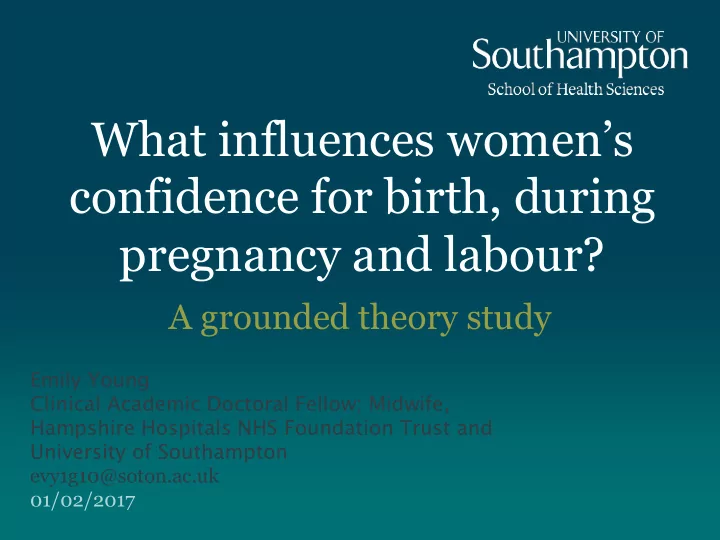

What influences women’s confidence for birth, during pregnancy and labour? A grounded theory study Emily Young Clinical Academic Doctoral Fellow; Midwife, Hampshire Hospitals NHS Foundation Trust and University of Southampton evy1g10@soton.ac.uk 01/02/2017
Why is confidence for birth important? • Holistic and woman-centred care is fundamental to providing quality maternity care, supporting women’s physical, psychological and social needs. – MMBRACE-UK (2015) – The Maternity Care Review (2016) – NICE (2014a, 2014b, 2016) – ICM (2005) – NMC (2015) 2
Expectations Fear of birth for birth Confidence for a Self-efficacy No research physiological broadly birth exploring women’s confidence for birth 3
So…what have we done? • Grounded theory study • 24 interviews to date, including mums in early and late pregnancy and postnatal and follow-up interviews • Over 181 social media threads • Currently in second and final cycle of data collection and analysis 4
Some of our findings: 1. Control – giving vs. taken away 2. Feeling like a failure 3. Expectations versus reality – birth plans 4. Social media 5
Control Giving over control to trusted people increased confidence “ Once I was there I stopped worrying because I had confidence in the medical team I thought well once I was there that is OK and also there is someone else in charge so when I was at home it was me making decisions about whether well should I phone them, should I go to hospital, what’s happening whereas when you are there you’ve got a midwife saying oh yes you are this many centimetres dilated and then everything is OK because someone else is looking after me ” (Emma). 6
Control Having control taken away decreased confidence “Scared. Scared and then I went in and first of all they broke my waters and I did start contracting but after two hours I was only 5cms dilated so they said that I would have to go on a drip and I said that I didn’t want to go on the drip and they said well I’m prepared to let you go another hour but, this is the consultant now, but you are at an increased risk of still birth if you choose not to go on the drip now, and of course what do you say? You just say I’ll go on it don’t you” (Talullah) 7
Feeling like a failure “Afterwards I was haunted by feelings of failure for months and felt that my mothering capabilities were suspect due to my inadequacy at giving birth . I’m absolutely terrified of the same thing happening, of being even more rubbish ” (Evie). “After two hours going nowhere, senior midwife said that I was just exhausted with the long labour and needed to be transferred to labour ward… I felt like such a failure , what kind of mother was I if I couldn't even give birth to my own baby? My notes even confirm it; 'failed to progress in second stage’ ” (Sienna). 8
Expectations versus reality • Reality meets expectations = increases confidence • Reality does not meet expectations = decreases confidence • Flexibility is key • “I didn’t feel in control. I felt, I think panicky…I felt a bit like a child I just wanted to run home and go no that’s not what I want to do. I felt that things had gone so far off how I’d imagined or how I’d hoped things would go which is why it is such a good idea not to have a plan in your head of what’s going to happen, go with the flow – that’s what I’m going to have on my next birth plan, go with the flow”(Lin). 9
Birth plans • Are they helpful? • Can empower and build women’s confidence • Can encourage rigid and unrealistic expectations 10
Social media • Childbirth is a profound experience - Traditional support structures have changed • Social media has become a powerful tool for increasing women’s confidence before/after birth • Empowering, confirming, normalising, questioning, challenging, disputing, overcoming isolation and seeking support - sisterhood 11
Recommendations • Language • Make birth plans empowering • Embrace social media • Don’t underestimate your importance! 12
Recommend
More recommend